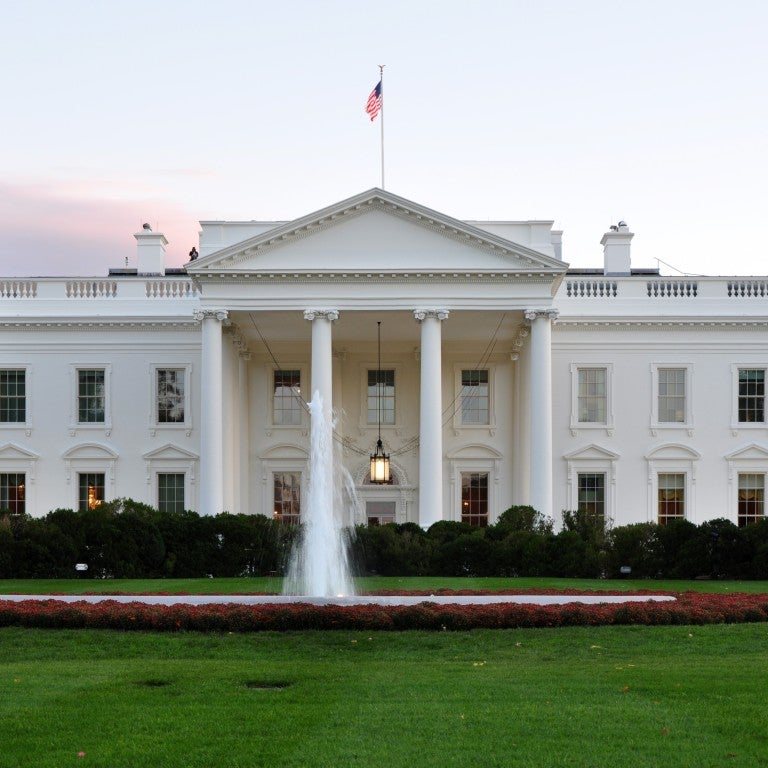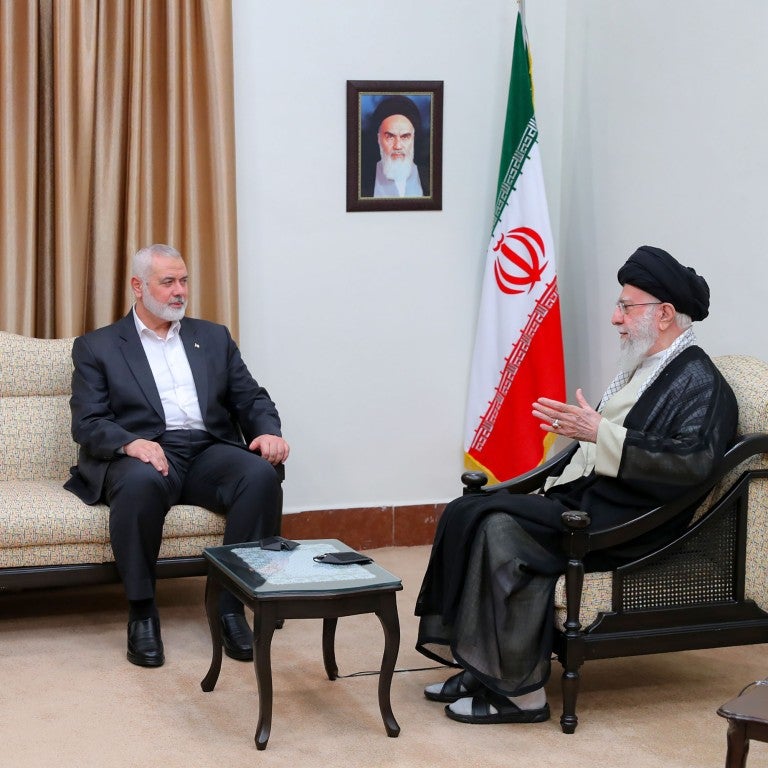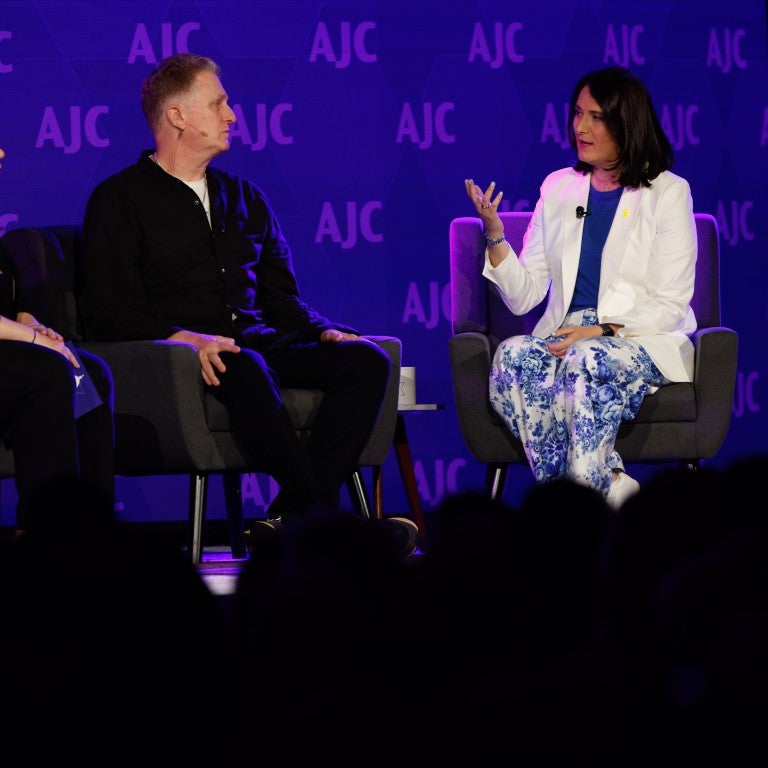August 15, 2024
“We live in a complicated world . . . We have to balance those tensions, and the way that we do that is not by running away from them and looking for simplistic answers, but actually by embracing that complexity.”
In his new book of essays, “The Center Must Hold,” Yair Zivan, Foreign Policy Advisor to Israel’s Opposition Leader Yair Lapid, who heads Israel’s largest centrist political party, argues for a return to centrist politics as an antidote to the extremism and polarized politics proliferating around the globe today.
The essays, by authors including Israel's former Prime Minister Yair Lapid, American political commentator Jennifer Rubin, former New York Mayor Michael Bloomberg, and philanthropist Catherine Murdoch, call populism fatally flawed and prescribe centrism as the solution to political ire around the globe.
*The views and opinions expressed by guests do not necessarily reflect the views or position of AJC.
Episode Lineup:
- (0:40) Yair Zivan
Show Notes:
Listen – People of the Pod:
- What the Unprecedented Assassinations of Terror Leaders Means for Israel and the Middle East
- Aviva Klompas is Fighting the Normalization of Antisemitism on Social Media
- On the Ground at the Republican National Convention: What's at Stake for Israel and the Middle East?
Follow People of the Pod on your favorite podcast app, and learn more at AJC.org/PeopleofthePod
You can reach us at: peopleofthepod@ajc.org
If you’ve appreciated this episode, please be sure to tell your friends, and rate and review us on Apple Podcasts.
Transcript of Interview with Yair Zivan:
Manya Brachear Pashman:
Yair Zivan has served as an advisor to Israel's Foreign Minister, Prime Minister and President. Most recently, he has edited a series of essays that argue for a return to centrist politics as an antidote to the extremism and polarized politics we see proliferating around the globe today. The title of that book: “The Center Must Hold”.
The essays by authors including Israel's former Prime Minister Yair Lapid, American political commentator Jennifer Rubin, former New York Mayor Michael Bloomberg and philanthropist Catherine Murdoch, call out populism as fatally flawed and prescribe centrism as the solution to political ire around the globe. Yair, welcome to People of the Pod.
Yair Zivan:
Thank you very much. Thank you for having me.
Manya Brachear Pashman:
So let's start with the title of this essay collection, which is a spin, your spin on the line from the Yates poem The Second Coming. And that poem was written more than a century ago, also during a time of worldwide angst after World War One and the flu pandemic and the poem's opening line is, things fall apart, the center cannot hold. Why do you argue the center must hold?
Yair Zivan:
So I think that the play on words there is about a kind of a fatalism that says it can't and saying, Well, we don't really have that luxury if we believe, as I do, that the center is the answer to the polarization and the populism and the extremism that's tearing us apart, then it simply has to hold.
Now that's not to say that it will automatically or by default. It means we have to go out and fight for it, and that's what I've been trying to do with the book and with the events around it, is to make the case that the center can hold if we go out and make that happen.
Manya Brachear Pashman:
So what is centrism anyway?
Yair Zivan:
It's a good place to start. I'll start with what centrism isn't. Centrism is not the middle. It's not a search for some point on a map between where the left and the right happen to be at any given time. That just leaves you getting dragged around from place to place by whatever the political winds are. It's not useful as a political idea. It's also not successful as a political idea.
Centrism says, here are a set of core values that we believe should be at the center of politics. They should be the things that are at the heart of our democratic political tradition, our political instinct. And you can trace it back to the early '90s, to Clinton and to Blair and the third way movement. You can trace it back much further, Oliver Wendell Holmes is often cited as a good example of a centrist political philosophy.
But at its core, what centrism says is we live in a complicated world, and we have to manage that complexity. We have to balance those tensions, and the way that we do that is not by running away from them and looking for simplistic answers, but actually by embracing that complexity. And by saying when we find the best balance between these competing tensions, and that's not to say split the difference and find the middle.
There are times when we go more one way and more another, it's to say that is the way that we can best hold within us the complexities of running a country today. And there are some very core values at the heart of that liberal patriotism, this idea that it's good to love your country. It's good to be a patriot without being a nationalist, without hating others, without having to degrade other people in order to affirm your sense of love for your own country.
We talk about equality of opportunity, the idea that the role of government is to give everybody the best possible chance to succeed. It's not to guarantee an equality of outcome at the end, but it's to say we're going to make sure that children have a good education system and that their health care system gives them a chance to succeed, and they have a hot meal every day, and then people that want to work hard and take those opportunities and be innovative will be able to succeed in society.
It talks about the politics of hope, as opposed to the politics of fear and division, so creating a national story that people can rally around, rather than one that divides us inevitably into camps and separates us, which is what I think populists and extremists try to do.
So there's a whole host of them, and I would say one of the core ones, and maybe why it's so important and so relevant now, is that centrism is the place where you defend liberal democracy. It's fashionable today to talk about the death of liberalism and why liberalism can't possibly survive, and liberal democracy is an aberration in human history, and really we’re meant to be ruled by kings and autocrats. And I say no, liberal democracy is good. It's actually the best system of government we've ever had, and we should work really hard to defend it and to protect it.
And the only place you can do that is in the political center. You can't trust the political right and the political left to defend the institutions of liberal democracy, because they only do it up until the point when it's uncomfortable for them. The right has taken on itself the mantle of free speech, and the right is really great at protecting free speech right up until the point that it's speech they don't like and then they're banning books in libraries.
And the left loves talking about protecting the institutions of liberal democracy until it disagrees with them, and then it's happy to start bending around the edges. The Center is the place where we say the institutions, the ideas, the culture of liberal democracy, is something that's worth defending and worth defending passionately and strongly.
Manya Brachear Pashman:
So I'm curious, are these core values universal to centrism, or are they really up to individual communities? Is it, in other words, is it up to communities, nations to decide what centrism is in their region, in their neck of the woods, if you will?
Yair Zivan:
So there is always variety in any political idea, in any political approach, where people adapt it to their own systems, but the core principles have to be the same core principles. And one of the things I set out to do in this book is to say, actually, centrism is something that works across the globe. So Malcolm Turnbull, the former Australian Prime Minister, and Andreas Velasco, a former presidential candidate in Latin America, and we have Argentinians, and we have a Japanese contributor, and the idea is to say centrism as the principles that I laid out as the core idea is the antidote to the extremism and polarization that we're seeing works everywhere, and that's actually a really important part.
Now, sure, there are different issues that you deal with in different countries. Also say the threat is different in different countries, if part of what we're doing is an alternative to extremism and polarization. Then in Latin America, people are more worried today about the rise of a populist far left, whereas in Europe, they might be more worried about the rise of a populist far right. And so the challenge is different and the response is different, but the core principles, I think, are the same and they are consistent.
Manya Brachear Pashman:
So do you believe that this philosophy is eroding? I mean, it seems to be happening at the same time around the world, in various democracies, Europe, United States, Israel. But do you agree? I mean, is this eroding, or is that too strong a word?
Yair Zivan:
Look, I think one of the problems with centrist is we're often not very good at talking about our successes and pretty down on ourselves, rather than actually taking pride in really good things that we've done and in places where we win and places where we do well, the test of a political idea is not if it wins every election. No one wins every election, right? That's part of politics as a pendulum. Sometimes you win, sometimes you lose, but the more important thing is not whether you win every election. And don't get me wrong, I work in politics. I like to win. I like to get votes. I like to be in government so that we can do the things that we care about, right? That's why we're in politics. But the test of the idea is whether it can also survive, defeat, an opposition and a time when you're not in power and come back from that stronger.
And I think centrism has done that, and can continue to do that. But part of the reason for the book is we haven't always been articulate enough, confident enough and coherent enough in the way that we present our case, and that's something that I hope this book will have some kind of role in changing. That is to say we need to be proud of our successes and our achievements. What happens when you have a successful centrist government, the next people in the political party that come along disavow it and move away from it. You saw it in Tony Blair's Labor Party. I would argue that new labor was an incredibly successful political project, and the thing that came next was a labor party that did everything it could to run away from that rather than embrace that legacy.
And as the Labor Party reembrace that legacy, not coincidentally, it also came to power again in the UK, and you see that across the world. I think there are places clearly where we're struggling and places where we need to do a better job, but I also think there are enough examples to show that centrism can work, and the kind of politics that we're pushing for can work and can be successful.
Manya Brachear Pashman:
So where is it struggling and where is it succeeding the most?
Yair Zivan:
So look, I'll talk about something that is maybe close to our heart on this podcast, and that's the situation in Israel today, Israel is going through the most difficult time, I think, as a country that certainly in our lifetimes, if not since 1948 we October 7 was was the darkest day that any of us lived through. I'm a little reticent to talk about the political response to that, but one of the things that's interesting from a centrist perspective, is the response of the Israeli public has not been to move to the right. It's been to move to the political center.
And if you look at opinion polls in Israel today, the next government, if elections were held today, would be a center center right government. And I'm confident that that will hold all the way through to whenever we have the next election. And I think that's because there is a sense in Israel that actually people want that type of governance. They want people who understand that you need to embrace compromise and moderation and pragmatism as values, rather than looking at them as kind of a political slur, as a vice, as something that we need to talk down about. And so I look at Israel as a place where, actually we lost the election.
In November 22 we elected a government that was, to my mind, very right wing. And populist and incredibly problematic. I think we've paid a very high price for that in the last 18 months or so, and now there is a move back towards the political center. Look, I think Emmanuel Macron has been an example of the success of political centrism. The fact that he struggled in the parliament in the most recent parliamentary elections is not an indictment of the fact that he managed to build a political center in France that wasn't really there before.
And the test, I guess, will be whether in two years, there is a successor from his party or not. So there are plenty of places I think that I can look out for being successful and where centrism does well. I think there's been some really good examples of political centrism in the US as well, despite the popular media narrative that everything is polarized. You look at groups like the problem solvers caucus in Congress, and you say, here is a group of members of Congress who are determined to work together, who are determined to cooperate and to find solutions to complicated problems and approach it in a really centrist way. Would I like to see centrists winning more in bigger majorities everywhere? Absolutely.
Manya Brachear Pashman:
Can you give an example of an issue, pick a country, any country, but an issue that would really benefit from that pragmatic approach, that pragmatic centrist approach, sir
Yair Zivan:
Arne Duncan, who was President Obama's Secretary of Education, who writes about a willingness to take on teachers unions and a willingness to demand standards and a sense of what is the focus of education, right? Where the focus of education should be providing the best possible education to children, something we should all be able to rally around, and yet, something that we seem to have lost along the way.
And I think education comes back again and again as a core centrist focus. That's one. The other one that I think is really interesting is the essay by Rachel Pritzker. Rachel writes about climate change and about environment, and in it, she makes what I think is a really compelling case that says we can't fight back against the need for energy abundance, because, particularly in the developing world, people need energy in order to improve their quality of life, and they need a lot more energy than they have now. And the idea that the solution to climate change is turning off the lights every so often for a bit longer, is just not practical.
Now it comes from a perspective that says climate change is real and is a problem and it's something we need to address, but it kind of pushes away from, I think, most of the orthodoxies of much of the kind of climate change movement and the environmental protection movement, and says we need something different. And that thing is a focus on technology and on innovation that will allow people to create the energy that they need in order to raise their quality of life, rather than demanding that they use less. That is, I think, a really great centrist approach. It's not a splitting of the difference. It's clearly coming down on the side that says climate change is real and it's a problem and it's something we have to address. But it's rejecting orthodoxies and offering something I think that's different.
Manya Brachear Pashman:
And this seems like such a no-brainer, right? I mean, it seems like these are our values, our principles that everyone should be able to agree upon, maybe not the methodology, right? Maybe that's what's up for debate. But it seems like these are just not points of contention.
Yair Zivan:
I think we're going against the grain of politics. I think today, people don't subscribe to a real full-throated defense of liberal democracy, and people aren't really willing to defend free speech, including speech that they don't like. And people are taking advantage of feelings of patriotism and dragging them to a pretty ugly nationalism or rejecting patriotism altogether. And so I think a lot of the ideas are not the most natural grain of where politics is. I was on a panel a few days ago, and one of the panelists turned to me, looked at me deeply, and said, I don't think I've ever met a centrist before.
And I thought, I think you probably have, right? And if not, then, nice to meet you, hi, I'm a centrist. But the idea that actually it's going against the trend in politics is one that troubles me. Part of what I'm trying to do is to say to people, if you are a centrist, then speak up. And it's difficult when you're a centrist, you are the biggest threat today. The fight in politics today is not between left and right, it's between the center and the extremes.
And so what happens when you come out and say, I'm a centrist? This is what I believe, is you find yourself attacked by the extremes, and that's sometimes a difficult place to be. When I put the first tweet out about my book within half an hour, I was called every name under the sun. I was a communist and a Nazi all at once, depending on who was attacking me, right?
You have to be able to withstand that too often. Centrists have been shy and have kind of hidden back and said, I don't really mean it, and actually, I don't want to have this fight. Or actually, let's not talk about politics now, rather than saying, here's a set of values I believe in, and I'm passionate about and I'm willing to fight for them, and you know what, I am as committed to them, I am as passionate about them, and I'm as willing to fight for them as the extremes are about theirs. And because I think the majority of people are centrist and are looking for that motivation, I think that allows us to win the political argument, because if we're proud enough, then people will line up behind us who already do agree with the principles, but maybe feel like they're alone or there aren't enough people that share their views.
Manya Brachear Pashman:
In other words, they're kind of anti-confrontational. They avoid confrontation, or perhaps too many centrists don't want to sound too passionate about their values, because. As perhaps passion equates to extreme.
Yair Zivan:
You should be able to be a passionate centrist. You should be passionate about defending liberal democracy. You should be passionate about being a liberal patriot. You should be passionate about trying to give children equality of opportunity, right? Those things are things that it's good to be passionate about, and you should care about them.
I just don't recognize in the centrism that I see being successful, this perception of timidity, or this perception of being scared, but what you have, I think, is too many centrists who have taken that path, and you have kind of backed off and backed away from being passionate about those arguments, and that's where we lose.
So my call to centrists is to be loud and to be proud and to be passionate about the things that we really care about and where there are places where people might feel a little bit uncomfortable with it and not want to be confrontational, because maybe it goes with the more moderate and pragmatic mindset. Is to say we have to overcome it because the issues are too important for us not to.
Manya Brachear Pashman:
Do I also want to clarify, being a centrist is not at the exclusion of the right or the left, right? It's more a conversation between both, or a consensus or a compromise of both, whatever works right, whatever works best for the greater good?
Yair Zivan:
There is an element of a rejection of the left and the right, to some extent, right, particularly of the fringes, and I'm incredibly critical of even some of the more moderate left and moderate right, because they're too willing to appease the extremes on their side. They're very good at calling out extremism and populism from the other camp, but not always good enough for calling out on their own side, which I think is where the challenge really lies. The idea is not to find a compromise.
The idea is not to split the difference between old ideas. It is about saying we should be focusing on what works. And I write a line in the book, slightly glibly, that, if it works, and if it makes people's lives better, does it really matter if it comes from Marx or from Hayek, right?
The political philosophy behind it certainly matters less than if it works the way that compromise can be a successful political tool. And I think we all compromise in our lives all the time, and suddenly when we get to politics, we see it as a sign of weakness or non-committal-ness or something like that, whereas in our everyday lives, we see it as a part of being able to function as an adult in society.
I think the goal of that, the way that you do that successfully, the way you compromise successfully, is by being really clear about what your values are and what your ideals are and what you believe. And only then can you go to a compromise. If I try to compromise with people without being very firm about what I believe and what's important to me, I'll just get dragged to wherever they are because they're passionate and I'm not. They're committed and I'm not. So you have to be really clear about what your values are.
And I actually think the real test about compromise is whether you do it when you're in a position of power, not in a position of weakness. In politics, people compromise because they have to. I say you should compromise because you want to. And I'll give a kind of an example, I guess. If I had 51% of the votes in Parliament, and I could pass anything I wanted, and I had a belief, a reform that I passionately believed and wanted to get through, and I could pass it 100% the way that I wanted, or I could take it down to 80% of what I want, and take 20% from other people and increase my majority from 51% to 75% I would do that because I think it's right, because I think building consensus builds more sustainable policy, because I think it creates a healthier democracy and a healthier political culture.
Because I have enough humility to say that maybe I don't know everything, and I'm not right about everything, and the other side has something useful to contribute, even to something that I'm really passionate about. That's the test of compromise. Do you do it when you don't have to, but because you think it's the right thing to do? And again, it's dependent on knowing what your values are and dependent on knowing what you're not willing to compromise on, because if you don't have that, then you don't have the anchor from which you take your political beliefs.
Manya Brachear Pashman:
In other words, kind of seeding a little bit to the other side, not because you have to, but because you need that little percentage bump to pass your legislation, but because you'll just build more of a consensus and more support on both sides of the aisle, or both sides of eight aisles, whatever, however it works. But yeah, I mean, it's really about building a consensus among lawmakers for the greater good, rather than just claiming that slim victory.
Yair Zivan:
Yeah, it creates better policy and more sustainable policy. But there's also limits to it. You very rarely in politics get 100% support for anything. And often, if you've got to the place where everyone supports it, then you've probably gone too far with the compromise, right, and you've probably watered it down too much.
There are very rare moments in politics when everybody agrees about something, and there are cases, and there are cases when we can do that, but on the really big issues, it's rare for us to get to that level of consensus, and I don't think that's necessarily desirable either. But being able to build a little bit beyond your political comfort zone, a little bit beyond your camp, I think, is a really useful thing in politics, and there are models where it works really well.
Manya Brachear Pashman:
So let me ask you more specifically. Okay, what is eroding centrism? What forces really are working against it and in the places where the center is maintaining its hold, are those forces in reverse? In other words, have they found a way to conquer those particular forces, or have they found a way to conquer what works against centrism, or has it just not reached them yet?
Yair Zivan:
So I'll start by flipping the question, I don't think it's about, does centrism work when other people aren't strong enough to attack it and to take it apart? Centrism works when it's strong enough, in and of itself, and it's defining the political agenda. The goal of what I'm trying to do with the book and with the arguments that I'm making is to say, we define what is at the core of democratic politics. Now everybody else is going to have to respond to us. So that's the first thing. Is that switch in mindset away from Are we able to withstand, where the extremes are, to a place where we say, actually, we're the solid anchor, and now we are the ones that are defining the political moment and the political issues. Where is it that we do well? Is where we're confident, right?
When we're able to stand up and be proud of ourselves, and then you're more easily able to rebuff some of those forces. Where do I think centrism struggles? One of the places where it struggles, and this is my criticism of my own camp, which I think is always important to have that kind of, I think, a little bit of self awareness. We're often not good enough at really connecting with people's fears and grievances and concerns that are genuine, right? People really are worried about technological innovation and the pace of automation, and people are worried about immigration. And you can be worried about immigration without being a racist and without being a person that should be shunned or that we should criticize.
There is a genuine reason why people are worried about these things, and we have to be better at really connecting to those grievances and fears that people have to really understand them, to really empathize with them. That is the cost of entry, to be able to suggest different policies to them. If I want to convince someone that populist politics aren't going to work, I have to show that I care about them as much as the Populists do, and not seed that ground. And I don't think we're always really good enough at doing that. Where we are good at doing that, there's a huge reward.
And ultimately, I believe that on every issue, the solutions that we offer from the political center are more successful than the solutions that are offered by the populists and by the extremists, but we have to be able to convince the public of that you can't disregard people who vote for somebody you find distasteful, even if you think that the candidate they're voting for is somebody that you have real problems with, and even if the candidate they're voting for is actually a racist or is actually illiberal and undemocratic.
That doesn't mean all the people voting for them are and it doesn't mean you can afford to dismiss those people. It means you need to do a better job of listening to them and connecting with them and bringing them back to our political camp. When politicians fail to get their message across because they're not doing a good enough job, it's not because of the public.
Manya Brachear Pashman:
Yair, thank you so much for joining us and for giving us a little bit of a pathway to expressing these kinds of views that aren't heard of a whole lot.
Yair Zivan:
Thank you very much. I really appreciate it.
Manya Brachear Pashman:
If you missed last week’s episode, be sure to tune in for a conversation between my colleague Julie Fishman Rayman, AJC’s Managing Director of Policy and Political Affairs, and Ron Kampeas, the Washington, D.C. Bureau Chief at the Jewish Telegraphic Agency.





